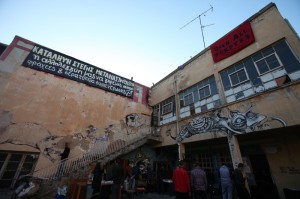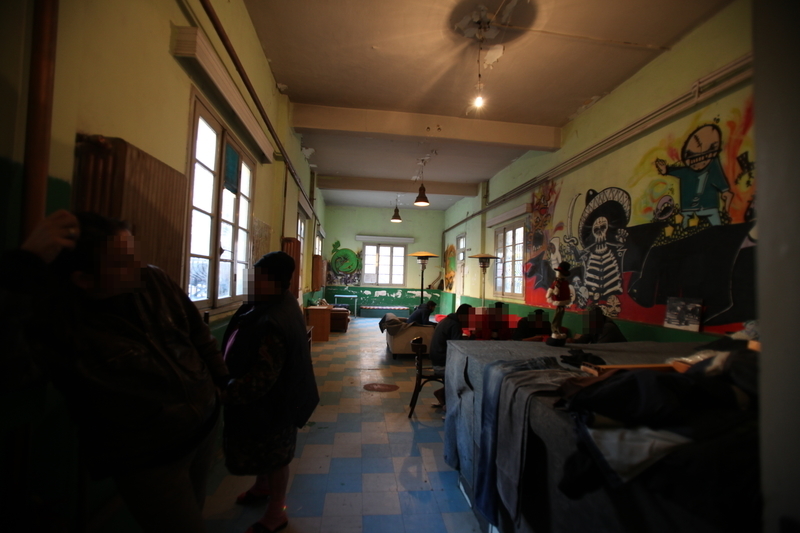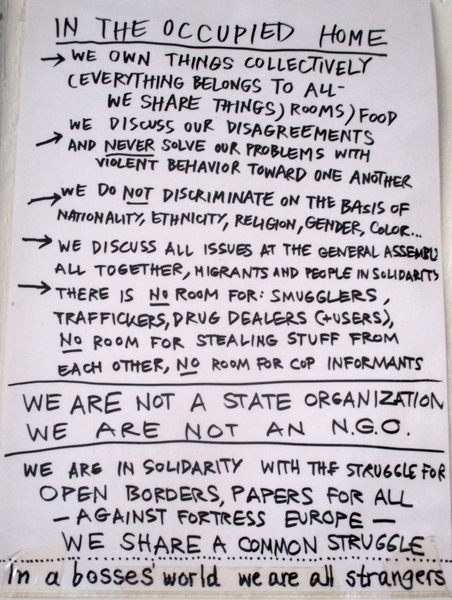 On 26th December we visited the Orfanotrofio Squat in Thessaloniki’s Toumba district. A place that was squatted and is now administrated by refugees and the “Anti-authoritarian Space” [1] as well as other active people from Thessaloniki.
On 26th December we visited the Orfanotrofio Squat in Thessaloniki’s Toumba district. A place that was squatted and is now administrated by refugees and the “Anti-authoritarian Space” [1] as well as other active people from Thessaloniki.
About the history
The plan to collectively organize a project like this emerged in September 2015. Connections and contacts between refugees and activists from Thessaloniki were established through the “No border kitchen” in Eidomeni. Together opportunities for meeting and living spaces were sought. Because the border closed three weeks ago (see also part 2 of our report) the creation of a self-organized space got necessary. For many people it became obvious that immediate action was inevitable. Consequently refugees that were rejected at the Macedonian border squatted together with people of the „Anti-authoritarian Space“, the so called ‘Orfanotrofio’. The church owned property was already squatted once in 2013.Three weeks ago, priests together with the cops, threatened to evict the place which did not happen yet. An anarchist comrade estimates the situation right now to be relatively relaxed. According to her, the cops have no reason to evict the place, because there seems to be no apparent political perspective nor will to create spaces for refugees and other socially marginalized groups. Nevertheless, it remains a squatted place and therefore is never absolutely safe.
“In the occupied home…”
Meanwhile ca. 70 people are living there: children, women*, men*, young and old. The building provides shelter for 54 refugees and about 20 additional persons. Among them is a formerly homeless woman from Thessaloniki, who actively participates in the squat. There are German activists as well, e.g. from Göttingen. In theory the squat can provide shelter for 120 people, but with minimal comfort under that condition. The house provides medical assistance, a kitchen, storage for aid goods, an assembly and community room and sleeping facilities. Daily assemblies build the organisational basis. Thereby they try to achieve general participation, because every decision is based on a consensus, which is found in the general assembly. It is a continuous effort to minimize barriers and therefore enable more refugees the participation at the assemblies. However this is a process that takes time. In the kitchen the “boundaries” disappeared for the most part. Here the meals are prepared together and a separation between refugees and activists, or men* and women* is hardly noticeable. That way, the woman that was once living in the street does not appear in the role of a homeless person, but is simply an active part of the project.
There are two assembly structures, one for the political framework and a second for the everyday tasks. From the second structure further teams developed. One team is responsible for the necessary material; the second is responsible for the kitchen. The third is the “welcome group”. They are for example occupied with helping newly arrived people finding a place to sleep or with organizing their transport to the squat. The fourth group is organizing the infrastructure, electricity, water, sanitary arrangements and heating. Furthermore there is a team of lawyers and medical personal. A variety of private persons and representatives from political groups take part in the assemblies as well and the Orfanotrofio receives wide support from other self-organized projects. Like this, in case of an eviction, people can find shelter in other squatted buildings.
In the neighbourhood the project is also received well. People arrive on a daily basis to bring donations or just drop in and manifest their solidarity. One reason for that is the history of this district, being a traditional left-winged working-class neighbourhood.
“In a bosses world we are all strangers”
There is no real political framework yet. Activists told us, that at the moment it is more important to provide direct help. Conflicts have to be resolved, meals prepared, rooms cleaned, and the living together has to be shaped. Joblessness, the resulting social stigmatisation and the lack of financial means are a major problem that lead to tension between people. Some comrades that we talked to, criticize in fact the missing political framework of the project, but support it nevertheless, because they acknowledge it as essential and see the necessity for immediate aid. They criticize that just squatting a house won’t give a perspective to the reufgees. On the other hand it can be a first step in order to present a different and self-organised way of action. Perspective also means being not excluded, being received and feeling welcome, being able to share one’s experiences and participate in the decision making on equal footing. Anyway life in the street does not provide such a perspective. A common political framework can arise, if the project has enough time to develop. Therefor we have to create the necessary political pressure. One first step isto publicise the project and provide direct support. The openness of the project also enables different people from a variety of backgrounds to participate. It is important to talk and to respect some basic principles, the just named comrade tells us further. Like this it is possible that the squat is supported on a broad basis and that the “Anti-authoritarian space” can collaborate with leftist groups and private persons. Meanwhile this results in a close meshed “network of the movement” that is made visible by means of a city map for refugees.
Among the basic principles are, e.g. the order to stay away from the house for drug dealers and users, human traffickers and cops. Emerging conflicts among each other should not be resolved with violence and there is no room for any kind of discrimination, it doesn’t matter wether it is based on nationality, gender or religion. Another important part of the self-concept is a clear differentiation from NGO’s and governmental institutions. Beyond that the Orfanotrofio declares it’s solidarity with all people on the run, no matter from where they come, whether they have legal documents or not. Their solidarity applies to all people that fight against the “European fortress” and for the global right to move freely.
Summary
At the Orfanotrofio the effort is made to live an alternative way. It is an example of how living space can arise and be self-organised. All of that is a process. But already this place provides a perspective for people within this seemingly futile situation. By the means of emancipatory and open approaches a place is to be created where refugees are listened to and equal participation is possible.
The Orfanotofio illustrates how important self-organised spaces, where people can find shelter, are. The networking of alike projects among each other, responsiveness and mutual help are strategies that enable us again to be capable of action, despite the pervasive repressive border regimes.
With a global integration of different self-organised centres we can spread information, be responsive, provide living and safe spaces and hence facilitate movement. The global solidary collaboration of autonomous projects is one strategy in the fight for an emancipated life, outside of governmental paternalism. These safe spaces we have to take and defend collectively.
We also want to initiate the discussion about self-organized spaces in Dresden. Regarding this there will bean event about social centres at the beginning of January. We invited people of the Leipzig initiative “social centre for all” and also want to talk about our experiences in Greece. We are glad to invite you and would be happy, if many interested people joined the discussion. Place and date will be announced.
The Orfanotrofio urgently needs support! There is a lack of industrial laundries to clean emergency covers from Eidomeni that were deliberately soiled by cops during the eviction of the camp. At the moment we are thinking about how direct aid can be provided to the Orfanotrofio. In case of existing non-profit association that could share their banking accounts for donations, please contact us. One possibility would be for example the integration in the Greek-German anti-authoritarian solidary fond that is discussed at the moment.
[1] The „anti-authoritarian Space“ is the name of the non-parliamentary structures in Greece that are organized horizontally, meaning with minimal hierarchies and neglecting of party politics. It includes private persons as well as different organized and loose groups that are oriented along anarchist and libertarian-communist ideas.


